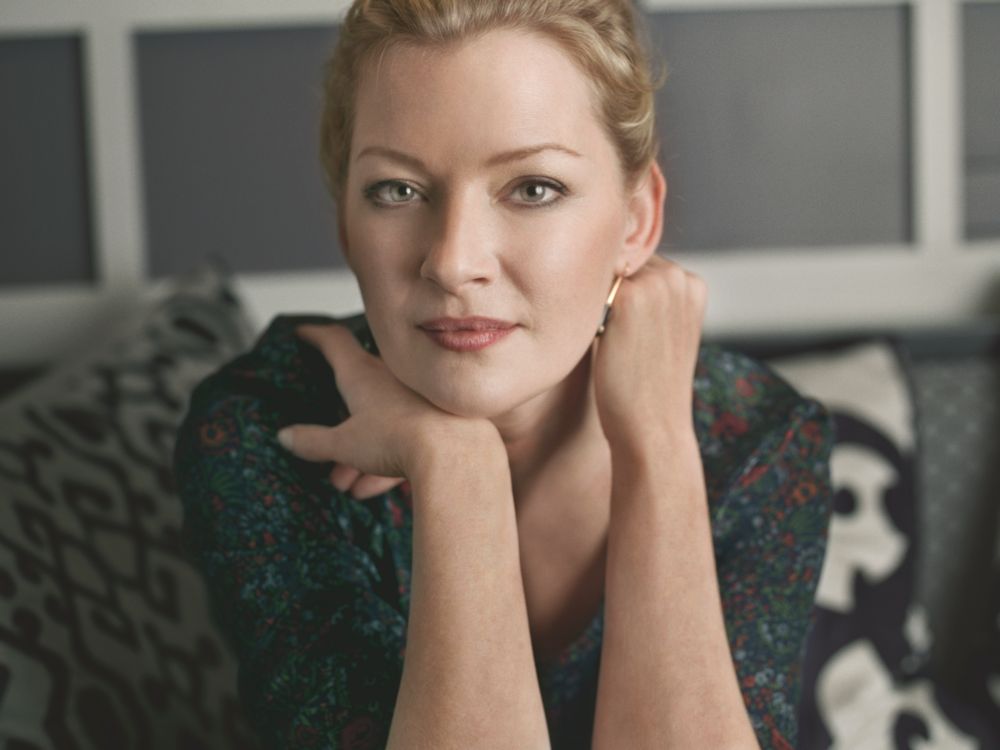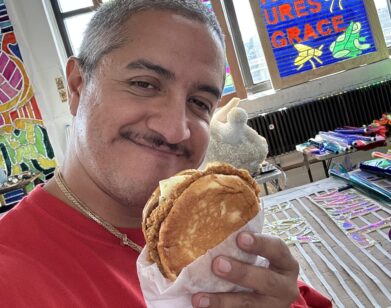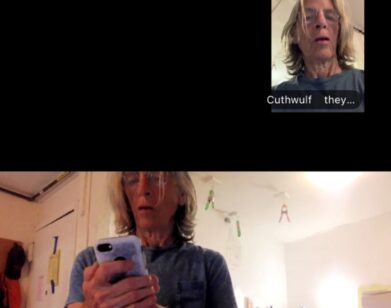The Many Mysteries of Gretchen Mol

ABOVE: GRETCHEN MOL IN NEW YORK, NOVEMBER 2012. PHOTO BY CHRISTOPHER GABELLO.
As Gillian Darmody, the steely madam in Boardwalk Empire, Gretchen Mol is terrifying and entrancing. Something about the actress lends itself perfectly to playing enigmatic roles—the sort of women who oscillate between vulnerable damsels in distress and calculating damsels causing distress. Perhaps it is her distinctive voice, which is at once soft, reassuring, and commanding.
Larissa, Mol’s role in Francine Volpe’s new play, The Good Mother, is one of these uncertain characters, an unreliable protagonist. As four men weave in and out of Larissa’s living room, the audience is never sure whether Larissa is a victim, a perpetrator, or neither. Produced by the New Group and directed by Scott Elliott, the thriller is Mol’s second off-Broadway production following Neil LaBute’s The Shape of Things (2001) with Paul Rudd and Rachel Weiss. She also played Roxie Hart in the Broadway musical Chicago (2004).
We recently spoke with Gretchen about her first impression of Larissa, and whether she is as dangerous as Gillian.
EMMA BROWN: I had never been to The Acorn Theatre before.
GRETCHEN MOL: It’s pretty intimate, right? I know I’d seen plays there, at Theatre Row, but I’m not sure I’d ever been in that particular [theater]. But it’s really sweet. I feel like the [audience] is looking at my toes. [laughs]
BROWN: Does it feel intimate wen you’re performing? Or is it just like any other space once the lights go out?
MOL: It’s a good mix. Definitely the lights are out, and I feel like I can look out and see an audience, but not see them specifically. It’s a little rough when you have a heavy breather in the front row, because they’re practically on stage with you. [laughs] You just have to keep your concentration. It’s not like a lot of spaces that I’ve been to.
BROWN: Is it the smallest theater that you’ve performed in?
MOL: Probably, although when I did The Shape of Things in London, we were at a temporary space. It was at the Almeida Theater, but it was this temporary space that they were using, this bus depot. It was in the round, it was just super, super intimate there, too. I think that’s the best way to see things, especially this kind of play where there’s no pyrotechnics, it’s literally just people talking.
BROWN: Can you tell me a little bit about how you got involved?
MOL: I read the script and was super intrigued by it. It was the kind of thing I couldn’t really say no to; I had never really had this opportunity before, to carry a show where I’m on stage for the whole hour and a half, I don’t really close my mouth very much. I just knew it would be a huge challenge, and I was really intrigued by Francine’s writing. It was certainly a puzzle that I knew I was going to have to figure out and try to find the answers to—sometimes I feel like I have to be comfortable not knowing everything. Sometimes you don’t really know why you do the things you do. But the character’s been so affected by her past, and she’s still kind of living her past. She hasn’t resolved a lot of the things she dealt with as a teenager in a very kind of haphazard way.
BROWN: What was your first impression of Larissa? As an audience member, your never really sure whether you can—or are even supposed to feel like you can—trust her.
MOL: Yeah, that was what was interesting. I liked that I was I wasn’t sure I liked her; I wasn’t sure how I felt about her. She’s super-flawed. I could relate to her in some ways. It’s so funny, because when I leave the theater I can always hear people talking about the character, and everyone always says, “You know, I know someone like her.” And I always think, Everyone knows someone like the characters; nobody is like the character. Nobody wants to admit that they are a little bit like that. I can see places where, if my life had gone in a different direction—some of the choices you makes when you’re in your teens and your early 20s, I fortunately feel that I haven’t been marked by those things—but in the case of the character, she really was. And she hasn’t let go of them, or learned and moved on from a lot of them. I think I could relate to her and her flaws, and so I felt the need to illuminate her a little bit. It’s fun to play a character when you can’t concern yourself with how sympathetic they are. Some people really feel for her and find her sympathetic. I think other people are really kind of repulsed by her.
BROWN: Do people tell you when they’re repulsed by her?
MOL: They don’t tell me, but I have the sense of it. You’re up there. There were times when I read the script as I was working on it, and she is an exhausting person. I could feel the toxicity of her and I could feel my patience being tried. Then other times I just felt utter sympathy for her. She has invited these various men into her world, but they’re all kind of manipulating each other. Nobody’s really exempt. She’s the focus of it, but they all have their ulterior motives.
BROWN: Like Gillian, your character on Boardwalk Empire, Larissa is a single mother, and a lone woman in the masculine world of the play. Do you feel like they’re similar?
MOL: Not really. Gillian is taken to a whole other level. Gillian is an extremely dangerous person, I don’t think of Larissa in that way. In the case of Gillian, I feel like there’s greed. I feel like the motivation for Larissa is her daughter and in a way her daughter really is herself. The part of herself that she can’t and never could really protect she finds in her daughter, and so her daughter becomes this childhood version of herself that she can now try to protect from what she perceives to be these creepy people.
BROWN: But do you think all parents feel that way?
MOL: I do. The thing about being a parent—I don’t know if you are—but it puts priorities in order. Thank God, you’re not totally focused on yourself anymore. You get to put your energy out, as opposed to worrying all the time about your own stuff. It’s such a relief, but when you think about it, it’s like an extension of you. It’s like a safer way; you feel less indulgent about it, but they are extensions of yourself, and I think you’re freer to love them so unconditionally. That, we’re not able to do with our own selves.
BROWN: Do your children know what you do?
MOL: My five-year-old has a sense; it’s still a little abstract. He’s seen me on set with my wig. He’s come to the Boardwalk set before, brought his tricycle. [laughs] He’s seeing tidbits of it, but I’m going to take him this weekend to the theater, so he can see the space, and I think he could maybe watch the first 10 minutes of the play from up in the sound booth or something with my husband.
BROWN: Larissa seems like she would be a very emotionally draining character to play; there’s so much going on in her life. How do you get from Larissa to being able to interact with your family when you come home?
MOL: I’d say in the rehearsal process it was more consuming to me, because I was in the throes of sorting it out, and I kind of needed that time. I’m really carefully about trying not to bring that around with me, especially with my kids. Who needs it? Also, the great thing about [my kids] is they would get me out of my crazy fears and anxiety about it. There were days when I could come home and want to close the door and cry—I couldn’t do that, and that was probably a good thing. As soon as you walk through the door, they’re like, “You’re home, and let’s make something out of cushions!” And it’s just like, “Shit. Okay.” And once you do it, it’s like, “That other thing that I was so consumed [by] and worried about, it’s a little bit smaller.” I think of it as play, literally. I can tell myself the things to get myself where I need to be before the performance starts once I get to the theater. Then as soon as I’m done, I’m done.
BROWN: Do you have the clichéd actor’s nightmare about forgetting your lines?
MOL: Yeah. [laughs] Always. I was really nervous after when we first started putting the show together, for the stumble-throughs. They were just the most painfully awkward; I was petrified. I would leave the theater thinking, “How can I get myself out of this?” I just don’t think I can do it. I just don’t think I can do this. And then after a few times doing it, it kind of started to click. It is kind of amazing how repetition—things just get in your body. I still worry about it, but you just have to make sure you’re mentally present all the time.
BROWN: Is it easier to get into character when you have the full script and you know this is where the play begins and ends, than when you have a television character and you find out a little bit more about them each week?
MOL: It’s just two different ways of processing the information. With the television thing, we’ve done three seasons now, and I remember between each season, you have this lull of time where you’re not with the character. And when you get those first pages, you’re like, “Who is she again? Huh? Where did we leave off?” Then you show up at the read-through and all of the sudden the voice is there, and you realize that the character is still stewing in you all that time, even in the downtime. I’ll still never know to the fullest extent what Gillian is capable of until they write it, so I’ve definitely been sort of shocked by some of the turns and twists that the character’s taken, but pleasantly so.
The process with the play, obviously, it belongs to you by the time you’re stepping on stage in front of that audience for the first time. You can change it by just a look or things you’re not even conscious of, but it’s such a full immersion. In a way I’d say [it’s] maybe more satisfying to do a play, because there is a beginning, middle, and end. But I also really enjoy the television experience, because there’s a certain part of it that you have to let go of and trust in that process. You have to relinquish a lot of control that you might otherwise be used to having. I kind of like that.
BROWN: How far in advance do you find out what happens on Boardwalk?
MOL: About two weeks.
BROWN: Do they give you a sort of overall trajectory for the season?
MOL: Not really. You can kind of ask around for details. You might get a little information here and there, even from the other actors, or “One person heard that…” I feel like the writers are always leaving their options open.
BROWN: Is there anyone you particularly beeline towards when you want to find out what’s going on?
MOL: [laughs] Not really. The first people that have the information are the hair and makeup ladies and the wardrobe people, because they often have to plan out the clothes: the things that are gonna get bloody, and the different kinds of gunshot wounds they’re gonna have to do. They often have more of a preparation, more time, than we do. You can definitely feel on set the actors trying to get that information, and they’re of sworn to secrecy. [laughs]
THE GOOD MOTHER IS CURRENTLY AT THE ACORN THEATRE IN NEW YORK. FOR MORE INFORMATION OR TO PURCHASE TICKETS, VISIT THE NEW GROUP WEBSITE. THE SEASON FINALE OF BOARDWALK EMPIRE AIRS THIS SUNDAY, DECEMBER 2, ON HBO.






